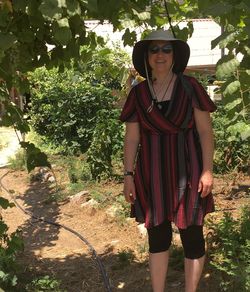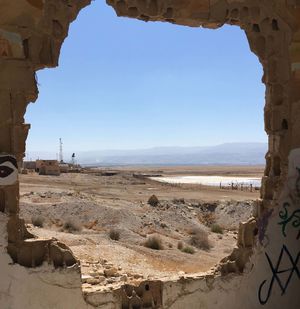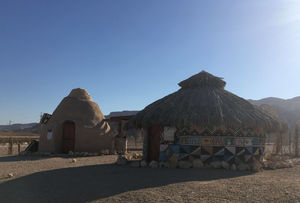
There is no river in Israel that doesn’t flow into Palestine and the reverse is true as well. This has profound implications for the need for transboundary management of environmental challenges, but many in the region are resistant to working across political borders.
Tantur is an ecumenical institute as well as Notre Dame’s Global Gateway in Jerusalem, with 10-20 undergraduates studying abroad there each semester and many graduate students and faculty attending conferences and workshops as well. Tantur stands on a beautiful hill covered with olive trees in the southern outskirts of Jerusalem; while it is a few minutes from Bethlehem and the Old City, it can seem a world apart. Both ecumenical and interfaith dialogue frequently bring very different perspectives together at Tantur.
Building communication and collaboration between disparate groups is a key theme in sustainability conversations in Israel and Palestine as well. Rachel Novick, Director of Notre Dame’s Minor in Sustainability, spent two weeks in the region this past summer, visiting over a dozen organizations, including universities, nonprofits and businesses to explore potential study abroad opportunities for Notre Dame students interested in sustainability.

"The learning opportunities here are vast, ranging from renewable energy to water conservation technology to ecotheology and environmental peace-building," Novick explains. "This region presents an opportunity for students to learn from the innovative approaches to resource scarcity that have been undertaken here for decades. In fact, drip irrigation, solar hot water, and other water efficient technologies were invented in Israel."
The country standardized a duel plumbing system, with a gray water pipe (sinks/showers) and black water pipe (toilets). Black water goes to sludge treatment, but gray water is not nearly as expensive to clean and can then be used for agriculture. Israel reuses 85% of its water. In places like the U.S., where all water goes through the same pipe, cleaning water to reuse is much more costly and less common. Israel began working on desalination twenty years ago and now has five desalination plants, with over 60% of its water coming from the Mediterranean.
"Access to water for everyone - Palestinians, Bedouin, Jordanians - everyone, is without question a critical building block for peace in the region, and there's a long way to go," says Novick. "As Pope Francis says, access to safe drinkable water is a basic and universal human right and condition for the exercise of other human rights."
Notre Dame students also have the potential to benefit from programs such as an English language master's in international sustainability at Tel Aviv University's Porter School for Environmental Studies and fully funded internships at a unique campus for desert research at Ben Gurion University in the south. Many nonprofits, with missions ranging from addressing environmental and public health challenges in Arab communities to training political and industry leaders in sustainability, expressed interest in hosting Notre Dame students as interns.
The highlight of the trip was a visit to the Arava Institute for Environmental Studies (AIES) at Kibbutz Ketura, where Novick studied abroad herself twenty years ago. In a place where it only rains around five times a year and typical summer days are often 105°F, it’s essential to adapt to the environment and efficiently manage resources. The student population at the institute is about a third Israeli, a third Palestinian and Jordanian, and a third international (mostly European and American).

Course topics range from ecotheology and environmental policy to desert ecology. The students live together, take a required course on leadership and peace-building, and intern for projects include bringing solar power to those that lack reliable energy. Students from very different backgrounds come together to engage around challenging topics and potential solutions. "Their students, after they come out of this program, go back to Israel and Palestine able to build bridges across deep political and cultural divides,” Novick says.
Arava Institute alumni are acitvely engaged in many of the thorniest issues facing environmental peace building efforts in Israel and Palestine. Along the many shared rivers, when one community lacks wastewater treatment, waste flows into the river and affects everyone downstream. Even on issues in which collaboration can lead to mutual benefit, however, political realities make working together incredibly difficult.
"It was inspiring to see so many organizations working on environmental peace-building and making real progress, despite the enormous challenges," says Novick. "It was also exciting to identify so many opportunities for our students to contribute to those efforts."
The trip highlighted the value of this region as a home base for students wanting to study issues of sustainability through the lenses of environmental peace building and adapting to resource scarcity. “We want to ensure that sustainability minors have great options for studying sustainability while they’re abroad,” Novick says. Not only is this invaluable for personal development, it is also essential for students to get a multicultural perspective on sustainability because it is such a global issue.